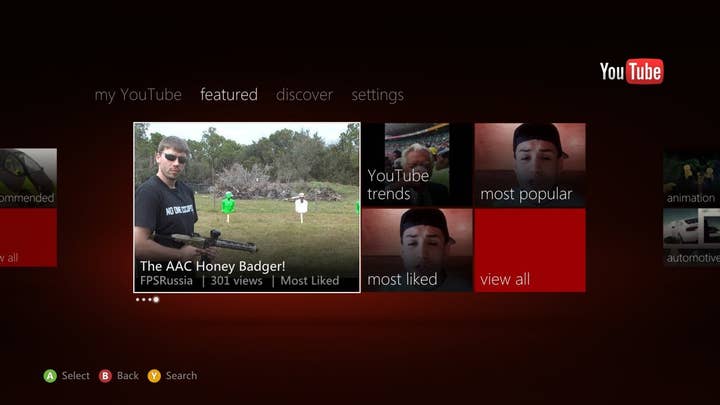In Theory: The Challenge of the Ten-Year Lifecycle
Will we still be playing PS3 and Xbox 360 in 2016?
There's also the notion that smartphone technology in general - be it contained in handsets, tablets or indeed TVs - could supersede current generation consoles fairly quickly. Some believe that the top-end A9600 version of the upcoming Sony Ericsson NovaThor chipset could finally see mobile tech reach the same approximate level as the Xbox 360 and PlayStation 3, thanks in no small part to IMG's PowerVR 'Rogue' chipset. Whether this will actually translate into competitive software clearly remains to be seen, but if the mobile market opens out into the living room via Smart TV technology, it could change the entire gaming landscape. The emergence of Unreal Engine 3 on mobile platforms is the first indication that current-gen tech could converge with mobile.
Timing of any next-gen announcement will be crucial. Revealing a next-gen successor calls time on the current, profitable hardware and focuses the attention of the core audience on the future rather than the present.
However, the existing home consoles have advantages of their own to help them weather the storm in that they are not static, fixed-platforms like the PlayStation 2 was in its day - they can evolve easily. Via firmware upgrades, the Xbox 360 and PS3 can be radically transformed in terms of functionality - indeed, we've already seen it happen more than once over the last few years. PS3 has expanded to support 3DTVs and operates beautifully in concert with the PSVita handheld and has always been the Blu-ray movie player of choice, while the Xbox 360 has undergone two drastic revisions of its front-end, first with NXE and more recently with the 'Metro' dashboard update which repositioned the 360 as a conduit for streaming video in addition to its position as a core gaming platform.
Indeed, recent rumours that the next-gen Xbox would arrive in two SKUs - a set-top box with Kinect functionality and a fully-fledged 360 successor - lead me to wonder if the current console itself, evolved, repackaged, and repositioned, may well be one of those SKUs. If the main job of the machine is to stream in HD media via the internet, there is absolutely nothing to stop it working on a Cloud-style basis to bring next-gen Xbox titles onto current-gen systems - only the support for the rumoured bundled Kinect 2 could cause issues there.


Embracing Cloud as part of its next-gen strategy could work for Microsoft. The platform would save an absolute fortune on loss-making hardware just for starters, and instead earn money via pay-per-play transactions and subscription packages. In terms of the system's suitability for hosting a Cloud-based gaming environment, the bottom line is that Xbox 360 has already proved that it can both stream and decode h.264 video so that's not really a problem. Indeed, behind closed doors at E3 2010, David Perry and the Gaikai team were demonstrating perennial favourite World of Warcraft operating quite nicely on an Xbox 360 devkit, proving conclusively that it can be done. Of all the major platform holders likely to embrace the Cloud, it's Microsoft that has the resources to create the infrastructure required and the in-house personnel to make it happen.
As a streaming platform, the Xbox 360 could easily live on to 2015 and beyond, as a Cloud-based portal to all manner of movie and gaming, with Kinect titles - which probably wouldn't need the sophistication of next-gen architecture - downloaded onto the system via Games on Demand and run using the existing 360 technology. At the same time, core gamers would most likely be satisfied with the more advanced second SKU, a more traditional piece of console hardware that would provide the high fidelity experience that audience demands, bypassing the latency and image quality issues that are almost certain to persist with streaming gameplay.
In terms of just when we will see actual replacements for the Xbox 360 and PlayStation 3, sources suggest that work is significantly further advanced on the Microsoft console than it is at Sony. I wouldn't be at all surprised to see something from the Nextbox team at E3 this year. The recent news that Crytek's first party Kinect title Ryse appears to have switched onto the next-gen platform strongly suggests that Microsoft will be ready sooner rather than later. With regards PlayStation 4, I'm told that work is still at the early stages on crucial elements of the developer toolset at Sony's R&D offices, so there's little reason to question the denials from Kaz Hirai and Andrew House about a potential E3 reveal.
Timing of any next-gen announcement will be crucial. Revealing a next-gen successor calls time on the current, profitable hardware and focuses the attention of the core audience on the future rather than the present. Certainly for Sony - with a raft of high-quality first party exclusives in the pipeline including a new game from the God of War team at Sony Santa Monica, plus Naughty Dog's The Last of Us, calling time on the current-gen PlayStation this year doesn't really make sense...
